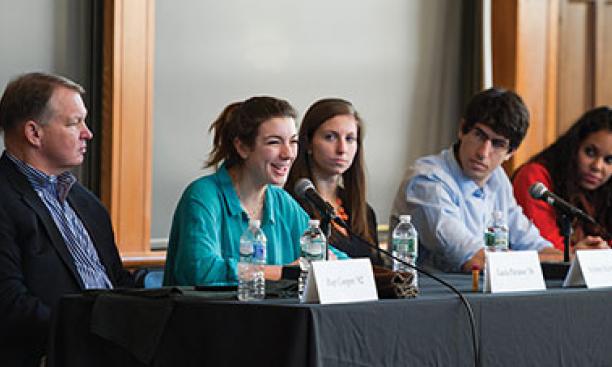

An Alumni Day forum on women and the eating clubs gave more than 250 alumni and students a chance to consider how issues of safety, respect, and leadership on the Street are related to gender.
Women have been elected president at four of the 11 eating clubs — Ivy, Tiger Inn, Colonial, and Terrace — for the coming year, the most since 2002. And overall club membership shows improved gender balance, club officials say.
But both students and alumni at the forum said the clubs need to do more to promote a safe, welcoming environment for all members. “There is a long way to go for the culture to change,” said Joanna Anyanwu ’15, a member of Cap and Gown.
Club leaders stressed the importance of allowing members to speak up about misbehavior by others without the fear of repercussions or ostracism. “This absolutely needs to be addressed,” said Sydney Kirby ’15, former vice president of Cannon Club. “We don’t have a system for it.”
Drinking makes women more vulnerable and “an easier target,” said Terrace Club president Lucia Perasso ’16. She urged the University and the clubs to spell out “where people can go for help if something happens to them at a club.”
Joe Margolies ’15, president of the Interclub Council and former president of Quadrangle Club, said the clubs have adopted new policies on sexual misconduct and interpersonal violence, and officers are receiving training “to be sure the culture really changes, to keep women’s leadership at the fore, and to keep each other mutually accountable.”
The Interclub Council, comprising the 11 eating club presidents, released a statement before this year’s bicker and sign-ins that promised “a climate of safety and respect” within each club and “the right of every participant to an experience free from all forms of harm and discrimination.”
While the clubs are heading in the right direction, Margolies told PAW, “not all environments in the clubs and on campus are equally safe for men and women,” citing instances of sexual misconduct and “less obvious interactions that occur on a daily basis that reinforce gender norms.” He said the ICC hopes to begin regular surveys to help determine “exactly what atmosphere exists for women in the clubs” and what steps may need to be taken.
The forum took place during an academic year in which the University revised its sexual-misconduct policies and in which several students at Tiger Inn were charged with violating those policies in connection with emails sent by club officers.
Hap Cooper ’82, president of the Tiger Inn grad board, told the forum that the club had instituted “a total overhaul” of bicker and initiations. A majority of new members and three of the club’s six officers are women, he said, and members now have a “hotline” to the grad board.
Sam Shweisky, head coach of the men’s volleyball team, said that coed clubs are a recruiting selling point and suggested that the clubs and the varsity coaches work together to improve the culture of the Street.
Thomas F. Fleming Jr. ’69, chairman of the Graduate Inter-Club Council, said the forum was an example of the “heightened dialogue” on the issue of maintaining a safe club environment. “Progress is clear, but we are still early in the process,” he said, adding that another event is being planned “which will explore the issues of minorities in the clubs.”
